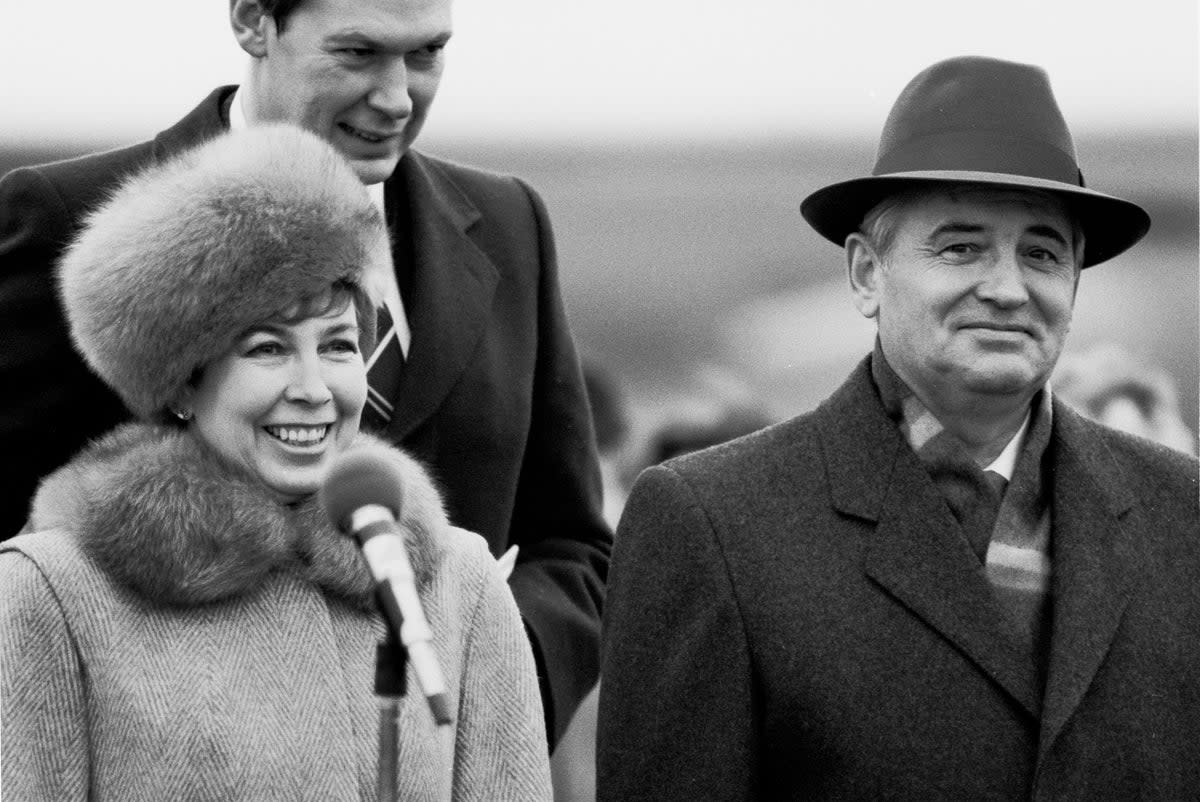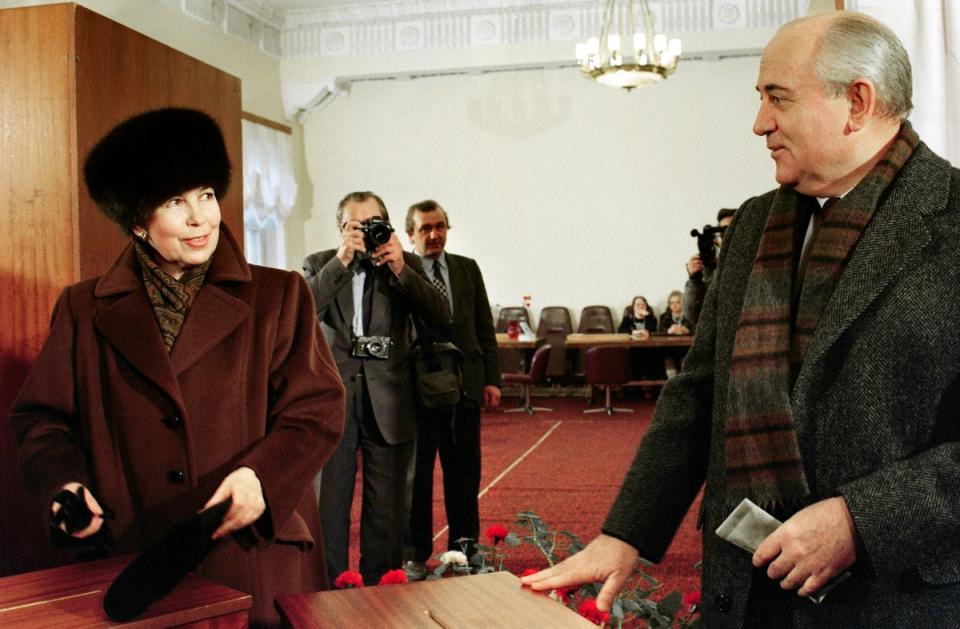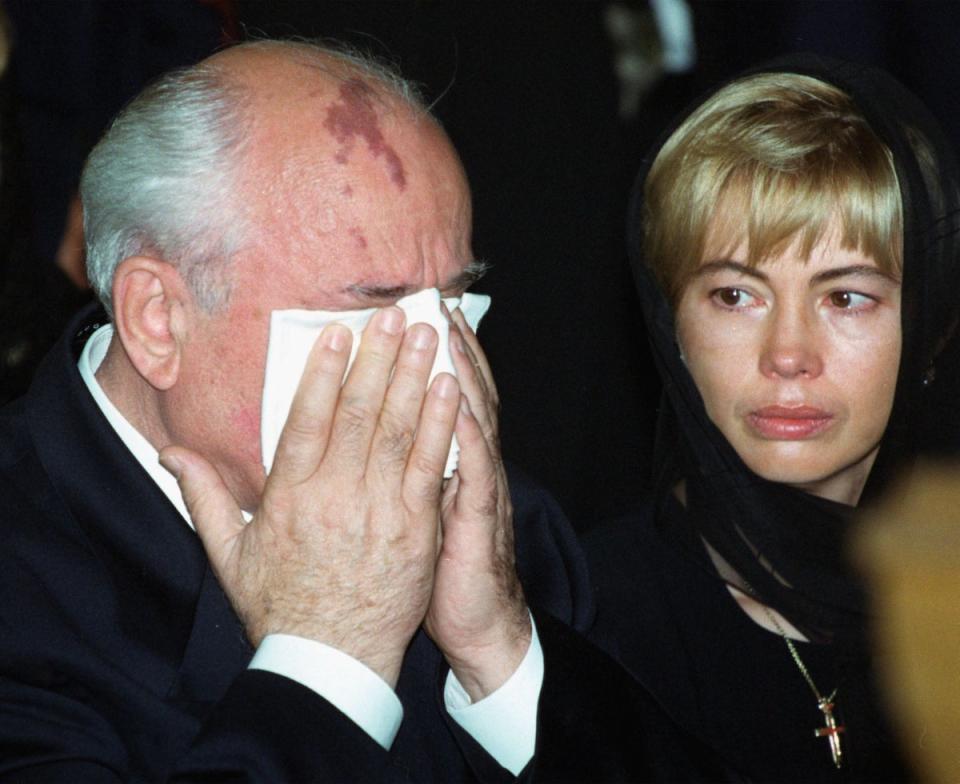Gorbachev and Raisa: A love story

- Oops!Something went wrong.Please try again later.
- Oops!Something went wrong.Please try again later.
- Oops!Something went wrong.Please try again later.
The moment the West’s image of the Soviet Union began to change can be pinpointed with some exactitude: it was December 1984, when Mikhail Gorbachev, then second-in-command at the Kremlin, arrived in London for talks with Margaret Thatcher which concluded with the British prime minister declaring, “I like Mr Gorbachev. We can do business together.”
It was a triumphant visit, but the success was not Mr Gorbachev’s alone. At his side throughout was his wife Raisa: elegant, with warm eyes and a chic and ever-changing outfit and a coiffed helmet of auburn hair, she was like no top Communist the West had ever seen. The contrast with the last Soviet wife to venture abroad, the frumpish and rustic Nina Khrushchev, could not have been starker. The British tabloids had a ball: “the new Gucci comrades”, they called them; their joint appearance with the Thatchers was a case of “Chequers chic”; one excitable hack went so far as to dub Raisa “the Bo Derek of the Steppes”. “What a contrast to the previous glimpses we have had of other senior Russian wives in the past,” wrote a columnist in the Daily Mirror, “who looked as though they should be building dams in Siberia.”
It was the international coming-out of a couple who were every bit as special as they appeared. Women’s emancipation had been a fundamental plank of the Bolshevik Revolution, as embodied by Vladimir Lenin’s wife Nadezhda Krupskaya, a fellow-revolutionary and a minister in the government until her death. But it cut against the deeply conservative grain of Russian life, and Stalin reversed direction. Women ended up with the worst of all worlds: bearing equal responsibility to work, whether teaching or driving a tractor, but with none of the status or power of men.
But Raisa Maxsomovna Gorbachev, nee Titarenko, refused to be trapped in this cage of inferiority. The brilliant daughter of an itinerant railway engineer, grand-daughter of a man executed for Trotskyism, Raisa met Mikhail at Moscow State University, where she was studying Philosophy and he was studying Law.
The budding politician fell deeply in love with the glamorous young philosopher. “I felt I was losing my head,” he wrote in his memoir, Alone With Myself. “I wanted to see Raisa and be wherever she was.” Recovering from a painful break-up, Raisa told him to get lost. “I told her I could not fulfil her request,” he wrote, “that for me it would be just a catastrophe. That was my confession of love.”
And in the course of time she reciprocated. “One day we took each other by the hand and went for a walk in the evening,” Gorbachev said 60 years later, “and we walked like that for our whole life.” He recalled the time they went swimming in a lake in a Moscow park when a thunderstorm struck. “I remember Raisa’s face in a flash of lightning, her scared, questioning eyes. I hugged her and clumsily but passionately started kissing her.” They married in 1953, when Raisa was 21 and Gorbachev 22.
Often we would discuss which of us was more lucky in marrying the other
Gorbachev
From the outset, Gorbachev adored the way she looked and dressed, the self-possessed elegance which caused such a splash abroad. “She had a natural aristocratic manner,” he wrote. “She was a person with a great sense of her own worth.” But equally it was a marriage of minds: he called her ‘my general.” “All my life, wherever I was, Raisa and I did not stop our dialogue,” he wrote after her death. “When I became general secretary and president, I would call Raisa two or three times a day, or she would call me.” He had no inhibitions about revealing their inter-dependence. “We discuss everything,” he told American TV anchor Tom Brokaw in 1987. “Including Soviet affairs at the highest level?” Brokaw asked. “I think I have answered your question in total,” Gorbachev affirmed. “We discuss everything.”

But the intimacy and equality of the First Couple that proved so revolutionary abroad were Raisa’s undoing back home. At first the Soviet public was merely mystified by this elegant shadow at Gorbachev’s side: was she a senior Communist official? Then they learned the truth. “Darling of Western news photographers, [Raisa Gorbachev] is probably the Soviet Union’s most unpopular woman,” one correspondent reported from Moscow in 1987. “If she were built like a tractor…she might arouse less envy and suspicion…In the Soviet Union, there is no public place for wives.” Another wrote, “‘What is she doing there?’ is the typical question posed by Soviet television viewers, who are not used to the wives of their leaders being seen in public.” And as Gorbachev’s attempt to open the economy only lengthened the queues outside shops and exacerbated social tensions, Raisa – with her large and expensive wardrobe, clearly purchased at the stores open only to senior apparatchiks – became a target of widespread envy and scorn.
From being his secret weapon, Raisa became her husband’s Achilles heel: when his former ally Boris Yeltsin repeated the vulgar view that she had too much influence, it signalled the final rupture between the men, the prelude to Gorbachev’s downfall. But Raisa did not hesitate to stay by his side: when he was detained at the family’s Black Sea dacha in 1991, she chose to remain with him throughout. In those dark days of house arrest, she suffered a stroke which temporarily paralysed one arm and affected her speech.

She recovered, and campaigned with him in the disastrous presidential election of 1996, during which they were heckled and even physically attacked, and which he humiliatingly lost. Her health collapsed again; when she was diagnosed with leukaemia in July 1999, her husband appealed to President Clinton and German Chancellor Gerhard Schoeder for expert medical help, and a specialist arrived from Freiburg the next day. She died in September, aged only 67.
Her final illness elicited a dramatic change of heart in Russia: thousands of letters of support and sympathy poured in, to Gorbachev’s astonishment. Russia’s most popular weekly, Argumenty Fakty, wrote, ‘We’ll remember her and be sorry for our cruelty. Many will have a drink tonight for her memory and wish that the earth is soft for her.’
Years later Gorbachev was still racked by guilt for what he considered his part in her premature death. “I really do blame myself,” he said in an interview in 2008. “I paid too heavy a price for perestroika. Raisa was so sensitive, and when the Yeltsin team started a campaign of slander, she took it too close to her heart.”
The intensity of their love for each other stayed with him for the rest of his life. “Often we would discuss which of us was more lucky in marrying the other,” he said in the same interview. “She died before we found an answer…I turn to her in my memories. I take force and power from them.” He recalled his most recent visit to her grave. “I went with all my family, and we took flowers. We spoke about her, and I felt peace, calm and strength. I would like her to know she is still loved the way she was loved when she was alive.”

